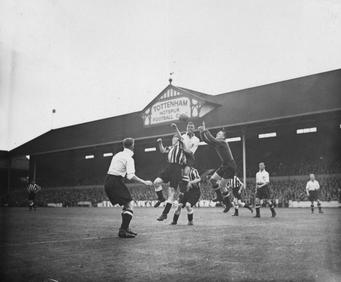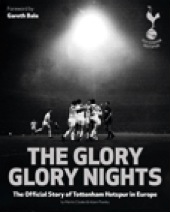 After the club’s formation in 1882, Spurs quickly established a reputation for playing attacking, flowing football that excited the growing number of spectators who turned up at the newly-enclosed ground on Tottenham Marshes. But there were other reasons, too, why Spurs rapidly gained a loyal following. Football at the time was dominated by club’s from the country’s industrial powerhouses – Blackburn Rovers, Preston North End, Sheffield United, and Aston Villa from the Midlands industrial sprawl around Birmingham. Those clubs were also from the north of the country, their power fuelled by their ability to draw support from the vast industrial working class populations of those towns. Spurs, represented something different. Clearly, the club was from the south, but the rise of Spurs also reflected the way the country was changing as the 19th century drew to a close. Britain was becoming more suburban and Spurs, situated firmly in the suburban sprawl of the country’s capital city, were ideally placed to take advantage. As they attracted support from the growing suburban population, they came to represent the rise of the south – dubbed The Flower of the South by fans eager to identify with a source of local pride. Alongside the north/south divide ran another – for the game in the north was played by professionals, while in the south football remained mainly an amateur pursuit. The reasons for this lay deep within the complexities of the English class system. For some, playing the game the correct way for its own sake was a noble ambition – the Corinthian spirit – while accepting payment was viewed as grubbily commercial and rather distasteful. In the south, the view of those running the game was firmly that payment – professionalism – was wrong, and it was this that led to an incident which further fuelled support for Tottenham Hotspur. At the beginning of the 1893/94 season, Spurs offered a winger called Ernie Payne a game. Payne was on the books at Fulham, also an amateur side, but had not yet played for the west Londoner’s first team. Deals of this sort were common at the time, with Payne able to move where he wanted. On the morning of his Spurs debut, Payne found that Spurs did not have a pair of boots in his size, so the club gave him ten shillings to buy a pair – on the understanding that the boots would belong to the club. Fulham complained to the London FA, accusing Spurs of offering an “unfair inducement”. Incredibly, the London FA found Spurs guilty, suspended Payne for a week and Spurs from playing any league games for a fortnight. The decision attracted enormous publicity and drew widespread sympathy for the club. In the eyes of the vast majority of people, the club had been unfairly treated, and when Spurs started playing again crowds eager to show their support for the victims of this perceived injustice flocked to see them. What became known as the Payne’s Boots Affair not only bolstered the club’s growing reputation, it helped convince many at the club that turning professional was the only way to compete on the national stage. It also attracted the support of a wealthy businessman, John Oliver, who began to establish a more solid structure, bringing in a professional trainer and funding the building of a new stand. In 1895, the club voted to turn professional, and the following year applied to join the Second Division of the national Football League. The application was turned down and Spurs instead joined the Southern League. The team was now attracting crowds of over 15,000 and so, in 1899, moved to a new ground just off Tottenham High Road, to a site which became the modern White Hart Lane. In the same year, Spurs won the Southern League, sealing victory against Portsmouth in the small town of New Malden in the county of Kent which was flooded with enthusiastic supporters of the Spurs. The lifting of the Southern League championship firmly established Spurs as the leading force in the south of England – the Flower of the South had blossomed. Next was to come an even more famous victory, as Spurs took on the north. About the Author: Martin Cloake is a writer and editor who lives in London, UK. A Spurs season ticket holder, he has followed the team since 1970, travelling all over the UK and Europe to support them. His latest book, Sound of the crowd, is a look at changing fan culture in England with an emphasis on Spurs supporters. He is a regular contributor to Spurs fansites and podcasts. He also writes more widely on football and the football business for a variety of publications including the New Statesman. Martin Cloake’s books about Tottenham Hotspur, including ebooks that can be downloaded directly to your computer or mobile device, can be ordered from his bookstore. View Full Bio Follow @MartinCloake More by Martin Cloake More articles
4 Comments
Suraj
30/9/2013 03:17:51 pm
Incredibly well researched and a compelling read once again! Interesting to note that the tradition of being unfairly treated by the FA is firmly entrenched in our history. Over a century later and we learn that somethings in life dont change!
Reply
Abhishek Singh
30/9/2013 03:18:01 pm
Can't wait for the next part, so much history this club has !!
Reply
Leave a Reply. |
Features
Flying Down to Rio History of T.H.F.C. Tribute to Bill Nicholson Talking Tottenham Early Legends The Road to Turin International Connections Hotspur Towers Most Read Articles
The 100 Year War Interview with Marina Sirtis A Long Dark Shadow By Royal Appointment School Report: An Insight into the Younger Eric Dier Dear Jimmy All Change At Spurs Hotspur Towers History Of THFC: Part 1 Passage to India: Rohan Rickets Thanks For The Memories Our Tommy Carroll The AVB Files: Part1 The Lilywhites You The Jury The Hand Of Hugo Connection - Argentina Creating a Reputation One Hotspur Archives
August 2018
Categories
All
|
 RSS Feed
RSS Feed

